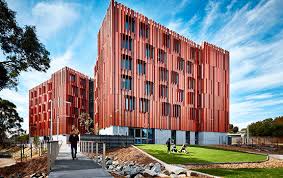Monash University Researchers Aim Towards Making Roads Resilient, Eco-friendly And Smart
Roads that can withstand floods and extreme heat while being constructed with eco-friendly materials using automated 3-D printing could be the future of Australia’s 900,000 km road network.
Federal Minister For Infrastructure, Transport, Regional Development and Local Government, the Hon Catherine King MP (l) and Monash Deputy-Vice Chancellor (Research) and Senior Vice-President Professor Rebekah Brown (c) at the SPARC Showcase. Image supplied
This is the vision of a dedicated team of researchers led by Monash University tasked with making our roads more resilient and lower cost to maintain and build.
Road surfaces could be laid out and maintained with state-of-the-art ground penetrating radar, soil testing and intelligent compaction technology, and sensors could even be embedded into road surfaces to help guide connected autonomous vehicles. Management of the whole network could be optimised using big data and cloud computing.
Roads are Australia’s largest publicly-owned infrastructure, and we spend around $7 billion a year just maintaining them. That is the highest per capita rate of maintenance expenditure in the world. But the Smart Pavements Australia Research Collaboration, or SPARC, is developing materials, technology and techniques to reduce that cost by up to $300 million a year. Pavement is the civil engineering term for road surfacing.
Federal Minister for Infrastructure, Transport, Regional Development and Local Government, the Hon Catherine King MP on Friday joined Monash Deputy Vice-Chancellor (Research) and Senior Vice-President Professor Rebekah Brown and industry representatives at the interactive SPARC Showcase at Monash College in Melbourne where researchers demonstrated the innovations, advancements and skill enhancements now under development.
“SPARC is a great example of universities working together with industry and government to address what is a national and global challenge – making road networks more resilient, cost effective and environmentally sustainable,” said Monash’s Professor Brown.
“The breadth of research and innovation underway in this area is extraordinary. Together they offer a vision of the future that will revolutionise the way we construct, maintain and manage our roads. It’s just another example of how Monash research seeks to address big challenges for the benefit of people and the planet,” Professor Brown said.
SPARC, funded by the Australian Research Council, is a collaboration of eight Australian universities; Monash University, Curtin University, Queensland University, RMIT University, Swinburne University, University of New South Wales, University of the Sunshine Coast and University of Technology Sydney.
The universities are joined by 20 industry partners and seven international research centres across 42 research projects.
“At SPARC we are working to transform the transport pavement industry to make our roads smarter, longer lasting, safer and more economical, with a lower environmental footprint,” said SPARC Director Professor Jayantha Kodikara from Monash’s Department of Civil Engineering.
“The cost of maintaining our roads is only going to rise as the population increases and climate change brings more extreme weather, making future proofing Australia’s road network an urgent priority,” Professor Kodikara said.
Monash secures more than $100 million in research income annually from industry, representing about 20 per cent of the University’s research income, and more than any other university in the country.

